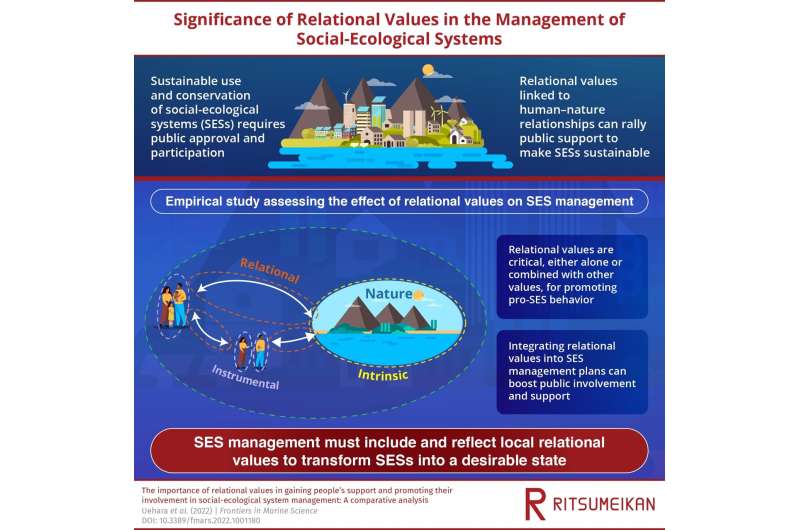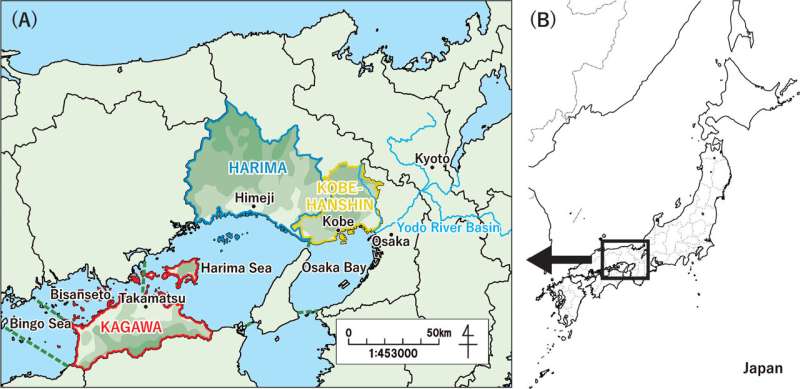The value of people's values: Study shows how relational values contribute towards sustainability

In today's world of excess, human-nature dynamics have become quite distorted and exploitative. Therefore, sustainable and mindful coexistence within our natural ecosystems has become the need of the hour. This is where sustainable social-ecological systems (SESs) come into play. SESs are complex adaptive systems that envelope the intricate interactions between people and their surroundings.
Effectual SES management requires balancing the improvement of human well-being along with conservation of ecosystem integrity. However, the success of an SES management plan rests upon the understanding, support, and participation of the people of the SES. To ensure this support and involvement, it is integral that management decisions align with people's wishes and the values they place on their natural environment.
Earlier studies have mainly focused on the instrumental and intrinsic values of nature. Instrumental value pertains to the necessity of something in achieving a particular end, whereas intrinsic value is when the thing is desirable in itself. However, few studies have looked into the significance of relational values of nature. These are values that arise from human–nature connectedness and encompass a sense of place, identity, and well-being that can motivate environmental stewardship.
Overcoming this paucity of research, a new study from Japan, which was published in Frontiers in Marine Science on December 8, 2022, has become the first to quantitatively reveal the essential role of relational values in people's readiness to participate in and support SES management.
"Relational values are preferences associated with positive human-nature relationships that are valued by people. Our research shows that by managing SESs that respect these relationships, SESs can become a more desirable state," says Prof. Takuro Uehara, a professor at Ritsumeikan University, Japan, and the lead researcher of the study.

Residents from three SESs surrounding the Seto Inland Sea in Japan were surveyed for the study. These included people from Kobe-Hanshin (N=1,136), Harima (N=864), and Kagawa (N=1,000). The study evaluated how relational values affect people's proclivity towards sustaining their SES.
This was measured by pro-SES behavior scales that were specifically designed for the studied SESs. These one-of-a-kind behavior-measuring scales included factors related to the sustainable utilization of natural resources and active human interaction with nature. These scales were created to be in line with the local conservation policies and the Japanese concept of "satoumi"—human-nature interactions that enhance ecosystem services while conserving nature.
The study found that while relational values correlate and overlap with instrumental and intrinsic values to some degree, they are also non-substitutable and important in their own right for the successful management of SESs. The study shows that integrating relational values—either as a single value class or as part of pooled values—is crucial for gaining the public's support for SES management. It also demonstrates that fostering such relational values can promote pro-SES behavior among people.
This can be achieved by improving environmental education, encouraging the consumption of locally sourced foods, and increasing opportunities for more nature-based leisure activities for the community. These results resonated across the three SESs, despite their social, demographic, cultural, and environmental differences.
Overall, this study makes a strong case for incorporating relational values into SES management plans in order to achieve a desirable state of SESs, which is both human- and ecosystem-centric.
"Relational values are typically place-based, and our study shows that these values can uniquely and meaningfully contribute towards understanding pro-SES behavior, which could have important management implications for individual SESs. In order to create a systemic change towards sustainability, relational values can be a deep leverage point since people are generally more willing to be involved in activities that support what they value," comments Prof. Uehara.
More information: Takuro Uehara et al, The importance of relational values in gaining people's support and promoting their involvement in social-ecological system management: A comparative analysis, Frontiers in Marine Science (2022). DOI: 10.3389/fmars.2022.1001180
Journal information: Frontiers in Marine Science
Provided by Ritsumeikan University





















